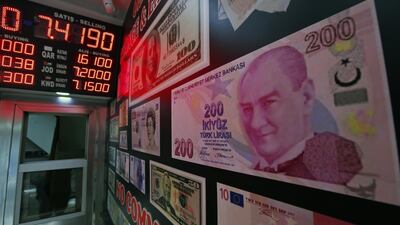Moody's Investors Service said a downgrade of Turkey's sovereign credit rating will hinge on the policies it takes to reduce risk of a balance of payments crisis amid an escalating standoff with the United States.
The lira rallied on Wednesday after Turkey's banking regulator took measures to shore up the battered currency. It had depreciated nearly 40 per cent against the dollar this year, driven by concerns over President Recep Tayyip Erdogan's macroeconomic policies and his stance against raising interest rates despite high inflation.
"We would likely downgrade Turkey's ratings if we conclude that policymaking is unlikely to be able to prevent a further deterioration in Turkey's external position, leading to a sustained rise in the risk of a balance of payments crisis," Mathias Angonin, sovereign analyst at Moody's, told The National.
In June, credit rating agency Moody's said it would place Turkey's credit rating on review for a downgrade, citing the uncertainty around the future direction of its macroeconomic policies. This came after it had cut its rating by one notch in March to Ba2, two levels below investment grade. During this week, the lira slumped to record lows, after the US imposed sanctions on Turkey for jailing an American pastor. The currency plunge raised concerns of a banking crisis and rekindled long-running worries about economic mismanagement.
_______________
Read more:
Turkey escalates US feud by increasing tariffs on products
_______________
Turkey slapped tariffs ranging from 60 to 140 per cent on some American goods in retaliation to the US moves, upping the stakes in a feud with the Nato ally on Wednesday. The taxed imports include alcohol, cars and tobacco, in retaliation to tariffs imposed by President Donald Trump last week on Turkish metals exports.
The new round of tariffs followed President Erdogan's call on Tuesday to boycott US electronic products and earlier urging Turks to sell their dollars and euros to prop up the lira.
Turkey's economic crisis has deeper roots beyond the market reaction triggered by rising tensions with the US. High inflation, a large current account deficit and a sizable external funding requirement are among the major factors behind the crisis, according to analysts.
"Worsening relations with the US, the unresponsiveness of policy (including the central bank’s) and fears of the politicisation of economic decision-making have exacerbated the situation," Monica Malik, chief economist at Abu Dhabi Commercial Bank, said in a report.
"We expect that Turkey will have to introduce deep fiscal and monetary tightening to stabilise the Turkish lira, which in turn will dampen economic activity further."
Markets have called on Turkey to increase its interest rate to help reduce high inflation levels, but President Erdogan's aversion to interest rates has been clear, calling them "the mother of all evil."
Turkey's banking watchdog on Wednesday limited the amount of currency swap transactions that banks can participate in by half. The move by the Banking Regulation and Supervision Agency, or BDDK as
it is known, is aimed at deterring short-selling of the currency.
However, investors are calling for more aggressive measures that will demonstrate the central bank's independence from the president by raising borrowing costs substantially.
"In the absence of aggressive central bank actions, however, the lira will continue to drop and net capital outflows will continue, " Andy Birch, principal economist at IHS Markit, said. "Without net capital inflows, reserves will fall farther, eventually undermining Turkey's ability to finance its current-account deficit, forcing a more substantial correction of the imbalance in the latter portions of 2018 and into 2019."

